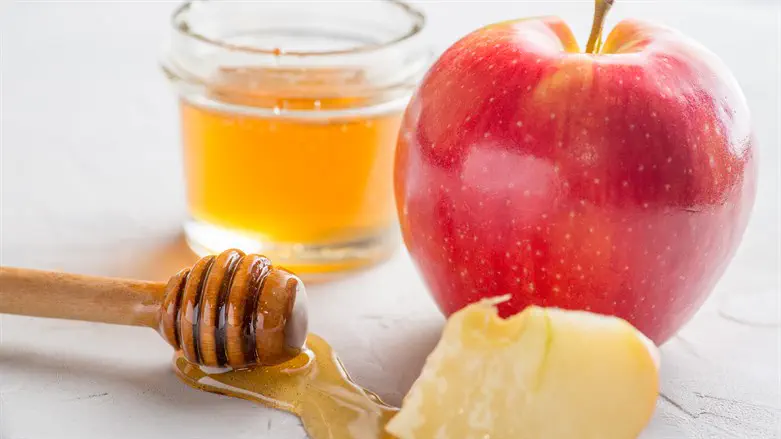
Efie Vogelis Director of Finance and IT at Torah Mitzion
Traditions and Minhagim (customs) generate the atmosphere and folklore of the holidays. Memories are inscribed into our recognition by the aromas and excitement created from traditional costumes and the halakhic obligation of each holiday, each chag.
When trying to understand the logic of some Minhagim we can question whether the Minhag is just a lively activity for the sake of tradition or is there a profound meaning behind them.
I wish to uncover a slight portion of the insights behind the minhag of the Rosh Hashanah symols, the "simanim".
First, a word with a double meaning. A whole siman (סימן, paragraph) in the Shulchan Ahruch is designated to the halakha of simanim (אורח חיים תקפ"ג), symols, but why? Do we truly believe that dipping an apple in honey can affect the sweetness of the upcoming year? Is the fate for someone lacking honey in risk of turning sour?
As surprising as it might be, the source of this minhag is in two gamars from the Bavli, Kritut 6A and Horayot 12A.
ת"ר אין מושחין את המלכים אלא על המעיין כדי שתימשך מלכותן ... אמר אביי השתא דאמרת סימנא מילתא היא יהא רגיל איניש למיכל ריש שתא קרא ורוביא כרתי סילקא ותמרי (כריתות ה:-ו.)
Tanu Rabanan: Kings are anointed only by the side of a spring, so that their rule be prolonged… Said Abaye: Since you hold that symbols are meaningful, every man should make it a habit to eat on New Year pumpkin, fenugreek, leek, beet and dates.
To emphasize the measure of difficulty in accepting this custom we can learn from the fact that Abaye would not have instituted it without having the source regarding the anointing of a king near a spring. This might be a result of having a minhag that borderlines with the prohibition of prediction and soothsaying in Vayikara 19:26.
"לֹא תְנַחֲשׁוּ וְלֹא תְעוֹנֵנוּ"
"You shall not practice divination or soothsaying".
The Rambam in the laws of Idolatry (Ch 11, halacha 4) writes:
"אין מנחשין כעבודת כוכבים, שנאמר: "לא תנחשו" כיצד הוא הנחש? ...וכן המשים סימנים לעצמו, אם יארע לי כך וכך אעשה דבר פלוני, ואם לא יארע לי לא אעשה, כאליעזר עבד אברהם. וכן כל כיוצא בדברים האלו הכל אסור, וכל העושה מעשה מפני דבר מדברים אלו, לוקה."
It is forbidden to practice soothsaying as idolaters do, as states: "Do not act as a soothsayer…."What is meant by a soothsayer? …Similarly, a person who sets up omens for himself, if this and this happens, I will do this. If it does not happen, I will not do it, as Eliezer, the servant of Avraham did, and the things of the like - all this is forbidden. Anyone who does one of these things because of such omens is [liable for] lashes.
Unlike the Tur and the Shulchan Aruch, the Rambam totally excludes the obligation of Rosh Hashana's Simanim.
So why do we practice Rosh Hashana's minhagim that are a hair's breadth away from sinning?
There are different approaches on explaining why simanim have value to them and therefore are not considered soothsaying.
The Mahara"l (Be'er Ha Golah, Be'er 2) says the way of transforming G-ds plans into reality is by having people to symbolically begin the process.
"ודע, כי כל גזרת עירין כאשר תצא מכח הגזירה אל פועל דמיון תהיה הגזירה מתקיימת...ומעתה תדע להבין דברים אלו כי הדבר הזה הוא חכמה נפלאה לעשות לגזירה עליונה דמיון וסימן למטה, כדי שתצא לפעול הטוב ותהי מתקיימת הגזירה לטוב..."
The Meiri's methodology is seeing in minhagim as an act of support and encouragement for those participating in the ritual.
"הרבה דברים הותרו לפעמים שהם דומים לנחש ולא מדרך נחש חלילה, אלא דרך סימן לעורר בו לבבו להנהגה טובה" (מאירי על הוריות יב.)
I wish to offer an additional direction.
According to Rabbi Eliezer (Bavli RH 10), Rosh Hashanah is the anniversary of creation, the day man was created.
The Yalkut Shimoney (Bereshit א) says that it took only ten hours into Rosh Hashanah before Adam and Chavah violated G-d's commandment by eating from Etz Hadaat.
Every year upon the arrival of Rosh Hashanah, G-d's annual coronation day, we try to correct the sin of opposing G-d's rulership by acknowledging that G-d is the ultimate cause for everything that happens.
When tasting a sweet apple dipped in honey, we can simply enjoy the taste, but we can also declare and reinforce the acknowledgment that G-d is the absolute source for granting a sweet life. It depends on us to be able to extract this belief from the simple action of eating.
The same with all the other simanim – the timing is at the same day G-d was ignored. While using the same object of eating fruit.
Is it a coincident that the justification of practicing the minhag of simanim on Rosh Hashanah is derived from the halakha of how are kings anointed?
Le- Shana Tova uMetuka!
Torah MiTzion stands in the forefront of the battle for the future of the Jewish people in the Diaspora, offering religious-Zionist Torah scholarship to Jewish communities throughout the world and strengthening the bond between the Jewish people in the Diaspora and in Israel via the study of Torah.